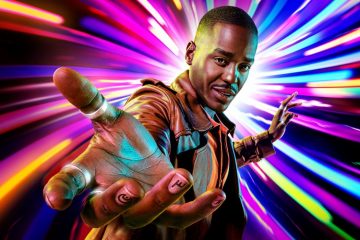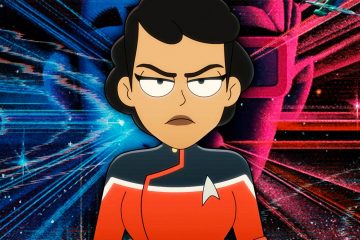The final 60th Anniversary special for Doctor Who, “The Giggle,” ends David Tennant’s nostalgic return as the Doctor. However, this installment especially highlights how bringing back Russell T Davies’ favorite Doctor is about much more than memories and warm feelings of series past. The ultimate result of his regeneration — or in this case, bigeneration — is about helping the character deal with his (and her) traumatic past(s). As the first woman to play the Doctor, Jodie Whittaker’s turn in the TARDIS was bound to be controversial with fans’ whose thinking is as stuck in the past as the time-machine’s chameleon circuit.The approach showrunner Chris Chibnall took towards the storytelling was deliberately different than what came before. When Russell T Davies returned as showrunner for the next incarnation, along with that big Disney-assisted budget, fans expected pure nostalgia for the 60th anniversary. However, the trio of stories proved to be massively consequential beyond Davies fixing his “Donna Noble mistake.” Beyond the introduction of bigeneration as a concept in the “Doctorverse,” these stories are important on a character level. The Doctor — a person constantly surrounded by friends or a “fam” — has found a real family. Beyond that, the Fourteenth Doctor is, perhaps for the first time in millennia, stopping to reflect on the past and heal.To see how this affects the Doctor, one needs to only look at the previous special, “Wild Blue Yonder” and its Flux mention. After talking to the Not-Thing Donna, Fourteen pounds the wall and screams in rage. It’s the rare outburst of emotion from the Doctor, who instead usually tamps down the feelings in favor of running around the TARDIS console programming in the next adventure. The Doctor never stops, even when he or she thinks she does. Rather, the Doctor simply goes from one crisis to the next, shedding the victories but carrying all the losses through the centuries.
The final 60th Anniversary special for Doctor Who, “The Giggle,” ends David Tennant’s nostalgic return as the Doctor. However, this installment especially highlights how bringing back Russell T Davies’ favorite Doctor is about much more than memories and warm feelings of series past. The ultimate result of his regeneration — or in this case, bigeneration — is about helping the character deal with his (and her) traumatic past(s). As the first woman to play the Doctor, Jodie Whittaker’s turn in the TARDIS was bound to be controversial with fans’ whose thinking is as stuck in the past as the time-machine’s chameleon circuit.
The approach showrunner Chris Chibnall took towards the storytelling was deliberately different than what came before. When Russell T Davies returned as showrunner for the next incarnation, along with that big Disney-assisted budget, fans expected pure nostalgia for the 60th anniversary. However, the trio of stories proved to be massively consequential beyond Davies fixing his “Donna Noble mistake.” Beyond the introduction of bigeneration as a concept in the “Doctorverse,” these stories are important on a character level. The Doctor — a person constantly surrounded by friends or a “fam” — has found a real family. Beyond that, the Fourteenth Doctor is, perhaps for the first time in millennia, stopping to reflect on the past and heal.
To see how this affects the Doctor, one needs to only look at the previous special, “Wild Blue Yonder” and its Flux mention. After talking to the Not-Thing Donna, Fourteen pounds the wall and screams in rage. It’s the rare outburst of emotion from the Doctor, who instead usually tamps down the feelings in favor of running around the TARDIS console programming in the next adventure. The Doctor never stops, even when he or she thinks she does. Rather, the Doctor simply goes from one crisis to the next, shedding the victories but carrying all the losses through the centuries.
#Doctor #Whos #Giggle #David #Tennants #Return #Nostalgia
Note:- (Not all news on the site expresses the point of view of the site, but we transmit this news automatically and translate it through programmatic technology on the site and not from a human editor. The content is auto-generated from a syndicated feed.))



